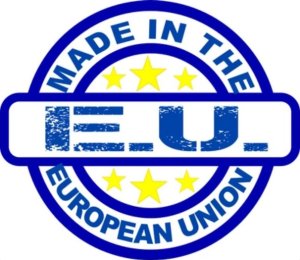A new study blasts the European Union’s proposed space act

This label would be more accurate if it read
“NOT made in the European Union”
A new study [pdf] just published by the generally leftist Progressive Policy Institute (PPI) has concluded that the proposed European Union’s space act would do great harm to both the European and American space industries if passed and should be reconsidered.
The economic analysis relied on the European Commission’s own estimates of increased compliance costs. The commission projected that the act would increase the cost of manufacturing a satellite in Europe by 2% and a launch vehicle by 1%. The study assumed companies would pass those costs on to customers through average price increases of 2.7%. Depending on price elasticity in each market segment, that could reduce demand by 1% to 13.6%. The resulting loss to European companies would be 245 million euros ($285 million) in annual revenue and 100 million euros in profits, the study concluded.
U.S. companies exporting to the EU would also be affected. The study estimates that American firms would lose 85 million euros in annual revenue and 7 million euros in profits from reduced European sales.
Officials from PPI are further quoted as opposed to the act as presently written, calling for a complete rewrite before passage. As PPI is a decidedly partisan leftwing think tank, formed initially by the Democratic Party in 1989, this clear public opposition to this decidedly leftwing top-down law suggests support for the bill is truly waning.
The bill itself won’t be voted on until the summer of 2026, and even if approved would not begin going into effect until 2027. Considering the opposition from the U.S. and other member nations of the European Union and the European Space Agency, it would demonstrate the EU’s utter disregard for its claimed democratic principles if it were to go ahead and ratify it as presently written. And that remains a possibility.

This label would be more accurate if it read
“NOT made in the European Union”
A new study [pdf] just published by the generally leftist Progressive Policy Institute (PPI) has concluded that the proposed European Union’s space act would do great harm to both the European and American space industries if passed and should be reconsidered.
The economic analysis relied on the European Commission’s own estimates of increased compliance costs. The commission projected that the act would increase the cost of manufacturing a satellite in Europe by 2% and a launch vehicle by 1%. The study assumed companies would pass those costs on to customers through average price increases of 2.7%. Depending on price elasticity in each market segment, that could reduce demand by 1% to 13.6%. The resulting loss to European companies would be 245 million euros ($285 million) in annual revenue and 100 million euros in profits, the study concluded.
U.S. companies exporting to the EU would also be affected. The study estimates that American firms would lose 85 million euros in annual revenue and 7 million euros in profits from reduced European sales.
Officials from PPI are further quoted as opposed to the act as presently written, calling for a complete rewrite before passage. As PPI is a decidedly partisan leftwing think tank, formed initially by the Democratic Party in 1989, this clear public opposition to this decidedly leftwing top-down law suggests support for the bill is truly waning.
The bill itself won’t be voted on until the summer of 2026, and even if approved would not begin going into effect until 2027. Considering the opposition from the U.S. and other member nations of the European Union and the European Space Agency, it would demonstrate the EU’s utter disregard for its claimed democratic principles if it were to go ahead and ratify it as presently written. And that remains a possibility.

